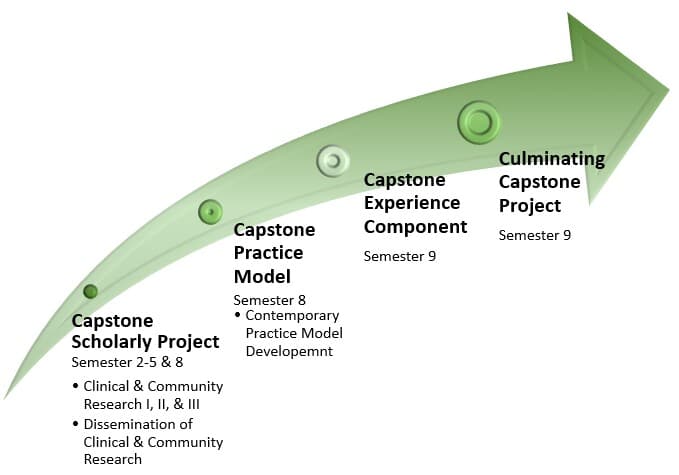Doctor of Occupational Therapy Capstone Experience
The Methodist University OTD Capstone Curriculum has four aligned components that begin in the first year of the curriculum and culminate on the last day of the ninth semester of the program. Each component of the capstone curriculum scaffolds on the previous to demonstrate the synergy of the OTD program outcomes.
The OTD Capstone Curriculum is a continuous learning model where research/scholarly work (I) supports the development of an evidence-based practice model (II) that can be applied in a real-world practice context (III) to produce a tangible outcome (IV) of the student experience through the integration of skills and knowledge from the didactic and fieldwork curricula.
Correspondingly, the student’s real world contextual learning experiences during Level II Fieldwork will inform their practice model development and generate new scholarly hypotheses, programmatic initiatives, or policy inquiries to further execute. Upon completion, the graduate will have designed and implemented a model of practice through profound synthesis and application of scholarly inquiry methods, leadership endeavors, advanced practice analysis and/or program development upon which to springboard the next steps in their professional career.
The Capstone Model

The Doctoral Capstone Experience Component (DEC) is a 14 week (560 hour) contextual experience designed to be the opportunity for the student to execute aspects of their Capstone Practice Model or conduct essential needs assessment or pilot program aspects to prepare for its implementation. The student works closely with the Faculty Capstone Mentor (FCM) and Academic Capstone Coordinator (ACC) to establish achievable learning and action objectives and a select a Capstone Experience site that is willing and able to partner with the OTD student to achieve the objectives. This experience is intended to be immersive and intense and at least 80% of the student’s time will be spent on site with the critical stakeholders for the implementation of their project. Current or prior work experience and prior fieldwork experience cannot be used to fulfill this component of the curriculum.
Supervision Requirements
As stated in the 2018 ACOTE Standards (D.1.6), the OTD DEC student will be mentored by an individual with expertise consistent with the student’s area of focus. The DEC Mentor does not have to be an occupational therapist. The student, OTD FCM, and the DEC Mentor will plan the Doctoral Capstone Experiential Component together through a thoughtful process.
Many professionals are qualified to supervise DEC students as they carry out research, program development, advocacy, teaching or policy work specific to their doctoral pursuits. The level and type of supervision will vary dependent upon the student’s competencies.
OTD Capstone Curriculum Examples:
These examples are theoretical and actual capstone components and products may vary by mentor, site availability, and year.
Student A
- Student elects to do her Scholarly Project around a question of what the history and course of therapy services looks like for adolescents who are preparing to transition out of high school. They perform retrospective data analysis at the local school district or develop/analyze a national survey of school-based practitioners serving this population.
- Develops a contemporary Practice Model around community-dwelling 18-22 year olds with developmental disabilities and OT role in a community agency to support this population to develop independent life and social skills.
- Doctoral Capstone Experience goals include being able to perform a needs assessment or program development project with Friendship House (or other community DD/ILS agency) to implement a component of the CPM.
- Culminating Capstone Project is the development of three life skills learning modules or a social learning training module for the peer residents living at the Friendship House.
Student B
- Student elects to do her Scholarly Project to collect and analyze student outcome data comparing active learning strategies compared to traditional didactic (lecture) education strategies in the Emerging Trends in OT courses.
- Develops a Contemporary Practice Model around novel curriculum design for OT Education or innovative education strategies or a model for professional development post-entry level graduation.
- Doctoral Capstone Experience goals include working in an OT Program (MUOT or other) to develop or redesign an entry-level course, perform TA duties, or design a CE course.
- Culminating Capstone Project is the development of a module of learning activities with aligned assessments that align with curriculum model.
Student C
- Student elects to do his Scholarly Project to collect and analyze shoulder flexion and trunk rotation data in chronic stroke patients with the motion capture lab equipment to validate the gaming-rehab program previously developed.
- In collaboration with core faculty, he develops his Contemporary Practice Model for a community clinic to serve underinsured patients with chronic disability from neurologic impairments, including accessible gaming rehab protocols and low tech adaptive device development.
- Doctoral Capstone Experience goals include needs assessment execution with local community center, Parks and Rec senior center, or local stroke support network to study the feasibility of the business plan.
- The Culminating Capstone Project would be a business plan or community block grant proposal for the community-based clinic.